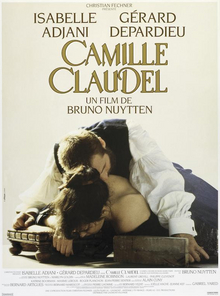Camille Claudel (film)
| Camille Claudel | |
|---|---|
 Theatrical release poster | |
| Directed by | Bruno Nuytten |
| Written by |
|
| Produced by | |
| Starring |
|
| Cinematography | Pierre Lhomme |
| Edited by |
|
| Music by | Gabriel Yared |
Production companies |
|
| Distributed by | Gaumont Distribution |
Release date |
|
Running time | 175 minutes |
| Country | France |
| Language | French |
| Box office | $23.7 million[1] |
Camille Claudel is a 1988 French biographical drama film directed by Bruno Nuytten, based on a biography by Reine-Marie Paris, the granddaughter of Paul Claudel. The film stars Isabelle Adjani as sculptor Camille Claudel and Gérard Depardieu as Auguste Rodin, with Adjani also serving as co-producer.
Camille Claudel was released in France in 1988 and recorded 2,717,136 admissions.[1] The film received critical acclaim upon release and earned Adjani a nomination for the Academy Award for Best Actress, the second of her career.
Plot
[edit]Set in late 19th-century France, the film follows the life of Camille Claudel, a talented young sculptor and the daughter of a wealthy but conservative family. With the support of her father, Claudel pursues her passion for sculpture, despite opposition from her devoutly Catholic mother. In the 1880s, she meets Auguste Rodin, and the two develop a close professional and romantic relationship.
As Claudel’s career progresses, she gains recognition in the art world while continuing to work closely with Rodin. However, their relationship begins to deteriorate due to Rodin’s increasing fame, his ongoing involvement with another woman, and Claudel’s growing frustrations with her lack of independence.
Following the death of her father, Claudel finds herself increasingly isolated, facing hostility from her mother and emotional strain from professional setbacks. Her mental health declines, and she becomes convinced that Rodin is sabotaging her career. Despite efforts by her brother Paul to support her, Claudel is eventually committed to a psychiatric institution, where she remains for the rest of her life.
Cast
[edit]- Isabelle Adjani as Camille Claudel
- Gérard Depardieu as Auguste Rodin
- Laurent Grévill as Paul Claudel
- Alain Cuny as Louis-Prosper Claudel
- Madeleine Robinson as Louise-Athanaïse Claudel
- Philippe Clévenot as Eugène Blot
- Katrine Boorman as Jessie Lipscomb
- Maxime Leroux as Claude Debussy
- Danièle Lebrun as Rose Beuret
- François Berléand as Doctor Michaux
Production
[edit]Principal photography began on 14 September 1987.[2]
Reception
[edit]Critical response
[edit]On the review aggregator website Rotten Tomatoes, Camille Claudel holds an approval rating of 92%, based on 12 reviews, with an average rating of 8.4/10.[3]
Roger Ebert of the Chicago Sun-Times praised the film as a compelling and emotionally resonant biographical drama, singling out Isabelle Adjani’s performance as “possessed” and “extraordinary.” He noted that while the film depicted the life of a sculptor, it was ultimately more concerned with the emotional toll of genius, ambition, and gendered social expectations.[4] Vincent Canby of The New York Times described Camille Claudel as a “visually handsome and beautifully acted drama,” highlighting Adjani’s portrayal of Claudel’s psychological unraveling as both restrained and deeply affecting.[5]
Variety praised the film’s production values and direction, calling it a “handsomely mounted biographical drama” and commending director Bruno Nuytten’s ability to capture the inner turmoil of the title character.[6] Time Out characterized the film as a “haunting and intense historical drama,” emphasizing the strong chemistry between Adjani and Gérard Depardieu and the film’s detailed evocation of 19th-century artistic life.[7]
Accolades
[edit]See also
[edit]- Camille Claudel 1915, 2013 film
- Rodin, 2017 film
- List of submissions to the 62nd Academy Awards for Best Foreign Language Film
- List of French submissions for the Academy Award for Best Foreign Language Film
- Mental illness in films
References
[edit]- ^ a b "Camille Claudel (1988)". JPBox-Office. Retrieved 3 March 2018.
- ^ "Camille Claudel".
- ^ "Camille Claudel". Rotten Tomatoes. Retrieved November 17, 2022.
- ^ "Camille Claudel movie review & film summary (1990) | Roger Ebert". www.rogerebert.com. Retrieved 2025-04-13.
- ^ Canby, Vincent (1989-12-22). "Review/Film; 'Camille Claudel,' a Soul's Disintegration". The New York Times. ISSN 0362-4331. Retrieved 2025-04-13.
- ^ Staff, Variety (1988-01-01). "Camille Claudel". Variety. Retrieved 2025-04-13.
- ^ GA. "Camille Claudel". Time Out Worldwide. Archived from the original on 2025-02-17. Retrieved 2025-04-13.
- ^ "Awards". www.berlinale.de. Retrieved 2025-04-13.
- ^ "César Awards 1989". MUBI. Retrieved 2025-04-13.
- ^ "New York Film Critics Circle Awards 1989". MUBI. Retrieved 2025-04-13.
- ^ Easton, Nina J. (1989-12-28). "'Fourth,' 'Harry/Sally,' 'Glory' Lead Globes Nods". Los Angeles Times. Retrieved 2025-04-13.
- ^ "1989 Archives". National Board of Review. Retrieved 2025-04-13.
- ^ "The 62nd Academy Awards | 1990". www.oscars.org. 2014-10-05. Retrieved 2025-04-13.
External links
[edit]
- 1988 films
- 1988 drama films
- 1980s biographical drama films
- Best Film César Award winners
- Biographical films about sculptors
- Cultural depictions of Auguste Rodin
- Cultural depictions of Camille Claudel
- Films based on biographies
- Films directed by Bruno Nuytten
- Films featuring a Best Actress César Award–winning performance
- Films scored by Gabriel Yared
- Films whose cinematographer won the Best Cinematography César Award
- French biographical drama films
- 1980s French-language films
- Gaumont (company) films
- 1980s French films
- 1988 in French cinema
- 1989 in American cinema
- Paul Claudel
- 1980s French film stubs
